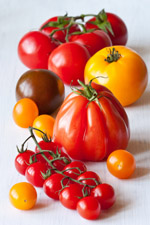Tomatoes are among the most readily available and versatile vegetables. Or are they a fruit? Nutritionally and culinary-wise, tomatoes are considered a vegetable because of the way they are used and their nutrients. Botanically speaking, tomatoes are more of a fruit.
Either way, this fruit/vegetable is high in nutrients and easy to use in many dishes.
Tomatoes are high in vitamin C, an antioxidant that is good for our skin, helps with healing and helps gums stay healthy. Foods with vitamin C also help the body absorb iron, so tomatoes are a favorite paired with meat or plant foods with iron. Tomatoes also have potassium, which helps lower blood pressure, magnesium, which is good for bone health, and fiber.
Lycopene i s another nutrient found in tomatoes. This antioxidant boosts health and is especially important for men’s prostate health. Processed and cooked tomato products — such as tomato paste, tomato sauce, ketchup or salsa — have the most lycopene. Heating and processing techniques make this nutrient more readily available for the body, but heating diminishes the vitamin C content. Enjoy eating fresh as well as cooked and processed tomatoes to get all their beneficial nutrients.
s another nutrient found in tomatoes. This antioxidant boosts health and is especially important for men’s prostate health. Processed and cooked tomato products — such as tomato paste, tomato sauce, ketchup or salsa — have the most lycopene. Heating and processing techniques make this nutrient more readily available for the body, but heating diminishes the vitamin C content. Enjoy eating fresh as well as cooked and processed tomatoes to get all their beneficial nutrients.
Tomatoes are in season from July to October, so that’s when you will find the best quality and prices. Locally-produced tomatoes are a tasty favorite in the summer. You can find tomatoes year-round in grocery stores, but prices and quality will vary.
Tomatoes should be stored at room temperature for up to a week. If they are not fully ripe, they will continue to ripen if they are stored out of the sun at room temperature. Make sure to rinse tomatoes with water before cutting or serving.
Tomatoes are versatile; you can eat them in many different ways. Add chopped tomatoes to a salad or pizza, slice tomatoes for your sandwiches or pair them with mozzarella cheese for a snack. You can make your own pasta sauce, soup or salsa using fresh tomatoes. They can be roasted in the oven or on the grill, or stuffed with anything you enjoy.
MU Extension has many publications available to help you learn more about tomatoes, including:
- Growing Home Garden Tomatoes(G6461). Free PDF
- How to Can Fresh Tomatoes(GH1456). Free PDF
- Freezing Vegetables(GH1503). Free PDF
- Seasonal and Simple: A Guide for Enjoying Fresh Fruits and Vegetables (MP909). $15.00 charge. Or try the free app.